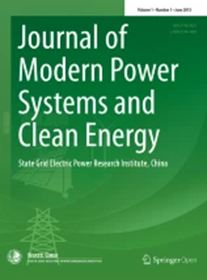Distributed Source-Load-Storage Cooperative Low-Carbon Scheduling Strategy Considering Vehicle-to-Grid Aggregators
IF 6.1
1区 工程技术
Q1 ENGINEERING, ELECTRICAL & ELECTRONIC
Journal of Modern Power Systems and Clean Energy
Pub Date : 2024-02-28
DOI:10.35833/MPCE.2023.000742
引用次数: 0
Abstract
The vehicle-to-grid (V2G) technology enables the bidirectional power flow between electric vehicle (EV) batteries and the power grid, making EV-based mobile energy storage an appealing supplement to stationary energy storage systems. However, the stochastic and volatile charging behaviors pose a challenge for EV fleets to engage directly in multi-agent cooperation. To unlock the scheduling potential of EVs, this paper proposes a source-load-storage cooperative low-carbon scheduling strategy considering V2G aggregators. The uncertainty of EV charging patterns is managed through a rolling-horizon control framework, where the scheduling and control horizons are adaptively adjusted according to the availability periods of EVs. Moreover, a Minkowski-sum based aggregation method is employed to evaluate the scheduling potential of aggregated EV fleets within a given scheduling horizon. This method effectively reduces the variable dimension while preserving the charging and discharging constraints of individual EVs. Subsequently, a Nash bargaining based cooperative scheduling model involving a distribution system operator (DSO), an EV aggregator (EVA), and a load aggregator (LA) is established to maximize the social welfare and improve the low-carbon performance of the system. This model is solved by the alternating direction method of multipliers (ADMM) algorithm in a distributed manner, with privacy of participants fully preserved. The proposed strategy is proven to achieve the objective of low-carbon economic operation.考虑车辆到电网聚合器的分布式源-负载-存储合作低碳调度策略
车辆到电网(V2G)技术实现了电动汽车(EV)电池与电网之间的双向电力流动,使基于电动汽车的移动储能成为固定储能系统的一种有吸引力的补充。然而,随机和不稳定的充电行为给电动汽车车队直接参与多代理合作带来了挑战。为了释放电动汽车的调度潜力,本文提出了一种考虑到 V2G 聚合器的源-荷-储合作低碳调度策略。电动汽车充电模式的不确定性通过滚动地平线控制框架进行管理,其中调度和控制地平线根据电动汽车的可用期进行自适应调整。此外,还采用了一种基于明考斯基和的聚合方法,以评估特定调度范围内聚合电动汽车车队的调度潜力。这种方法有效地减少了变量维度,同时保留了单个电动汽车的充电和放电约束。随后,建立了一个基于纳什讨价还价的合作调度模型,涉及配电系统运营商(DSO)、电动汽车聚合器(EVA)和负载聚合器(LA),以实现社会福利最大化并提高系统的低碳性能。该模型采用交替乘法(ADMM)算法以分布式方式求解,并充分保护参与者的隐私。实践证明,所提出的策略能够实现低碳经济运行的目标。
本文章由计算机程序翻译,如有差异,请以英文原文为准。
求助全文
约1分钟内获得全文
求助全文
来源期刊

Journal of Modern Power Systems and Clean Energy
ENGINEERING, ELECTRICAL & ELECTRONIC-
CiteScore
12.30
自引率
14.30%
发文量
97
审稿时长
13 weeks
期刊介绍:
Journal of Modern Power Systems and Clean Energy (MPCE), commencing from June, 2013, is a newly established, peer-reviewed and quarterly published journal in English. It is the first international power engineering journal originated in mainland China. MPCE publishes original papers, short letters and review articles in the field of modern power systems with focus on smart grid technology and renewable energy integration, etc.
 求助内容:
求助内容: 应助结果提醒方式:
应助结果提醒方式:


